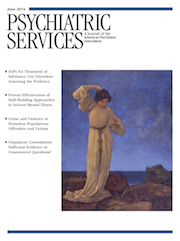Risk of Hospitalization and Use of First- Versus Second-Generation Antipsychotics Among Nursing Home Residents
Abstract
Objective
The study compared the risk of all-cause hospitalization associated with use of first- versus second-generation antipsychotics among elderly nursing home residents who were eligible for both Medicare and Medicaid.
Methods
A retrospective cohort study design was used to compare the risk of all-cause hospitalization among dual-eligible nursing home residents (≥65 years) during the 180 days after a new prescription for a first-generation (N=3,611) or a second-generation (N=46,293) antipsychotic. Propensity scores created from Medicare and Medicaid Analytic eXtract data were used to identify a matched cohort of equal numbers of users of each antipsychotic class (N=3,609). The Cox proportional model and the extended Cox hazard model were used to evaluate the risk of all-cause hospitalization in the matched cohort.
Results
The unadjusted rates of all-cause hospitalization were 21.3% and 30.5% among users of first- and second-generation antipsychotics, respectively. The Cox proportional model revealed a significant difference between the two classes in risk of all-cause hospitalization (hazard ratio [HR]=1.33, p<.001). There was no difference in hospitalization risk among users of first- versus second-generation antipsychotics within the first 20 days of use; however, the odds of hospitalization among users of first-generation antipsychotics increased by 58% after 20 days of use (HR=1.58, p<.001).
Conclusions
The study findings suggest that use of first- versus second-generation antipsychotics lasting more than 20 days is associated with a differential risk of all-cause hospitalization, possibly due to differential safety profiles of the two classes. Consequently, there is a need to monitor the use of antipsychotics by elderly patients, especially after a period of initial use.



